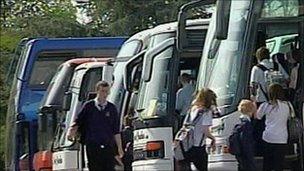Hertfordshire parents question school transport policy
- Published

Hertfordshire children will only get free transport to their nearest school, which could be over the border
Campaigning parents say a proposed new school transport policy will discriminate against children living near Hertfordshire's borders.
Currently, the council offers free school transport to the nearest Hertfordshire secondary school.
Beyond 2012, it wants to offer transport to the nearest school, even if that is over the county border.
Hertfordshire County Council said the system had to change due to financial constraints.
Jacinthe Betts is a parent who lives in Lilley in Hertfordshire, which is close to the Bedfordshire boundary.
Priority area
Currently, children in this village can get a free bus to their nearest secondary school which is in Hitchin.
Under the new system they could still get a place at the Hitchin school, but would only get free transport to their nearest school, which is in Luton.
Ms Betts said that for 17 villages in Hertfordshire, their nearest secondary school is not within the county.
"At the moment we have an excellent, much-valued service that provides transport to our nearest priority area [Hertfordshire] school," she said.
"Our children will have grown up through the school system already having six years education within a Hertfordshire school.
"They will have developed their friendship base and at the end of the day, we pay tax to Hertfordshire. We are Hertfordshire residents and we feel that we have entitlement to Hertfordshire schools."
The county council has carried out consultations and has tried to put together a wider spread of provision but Councillor Richard Thake, the Conservative councillor in charge of education at Hertfordshire County Council, said that the system had to change because of financial constraints.
'Extenuating circumstances'
"The statutory position is quite clear," he said. "There is a judgement called the Greenwich Judgement which insists that for admission purposes, county boundaries are invisible. The nearest school is the nearest school.
"For many, many years Hertfordshire has had a discretion by the director of education and we have operated that discretion to say that the nearest school will be one within Hertfordshire, " he said.
"We can't afford to do this now. We have not got the £4.9m to £5m which we currently spend on discretionary transport."
The new policy will not affect those children who are already receiving discretionary transport as they will continue to get free transport to their nearest Hertfordshire school.
Mr Thake said that the council would consider individual cases.
"If there are extenuating circumstances then a parent can make an application and the director can make a decision. This is not just slamming the door. We do recognise this is a huge change because parents have become used to it."
The policy has already gone through the highways and education panels of the council and a recommendation will be going to the cabinet, which is the decision-making body.
Until that process has been completed, the policy will not come into force.
- Published23 February 2011
- Published21 October 2010